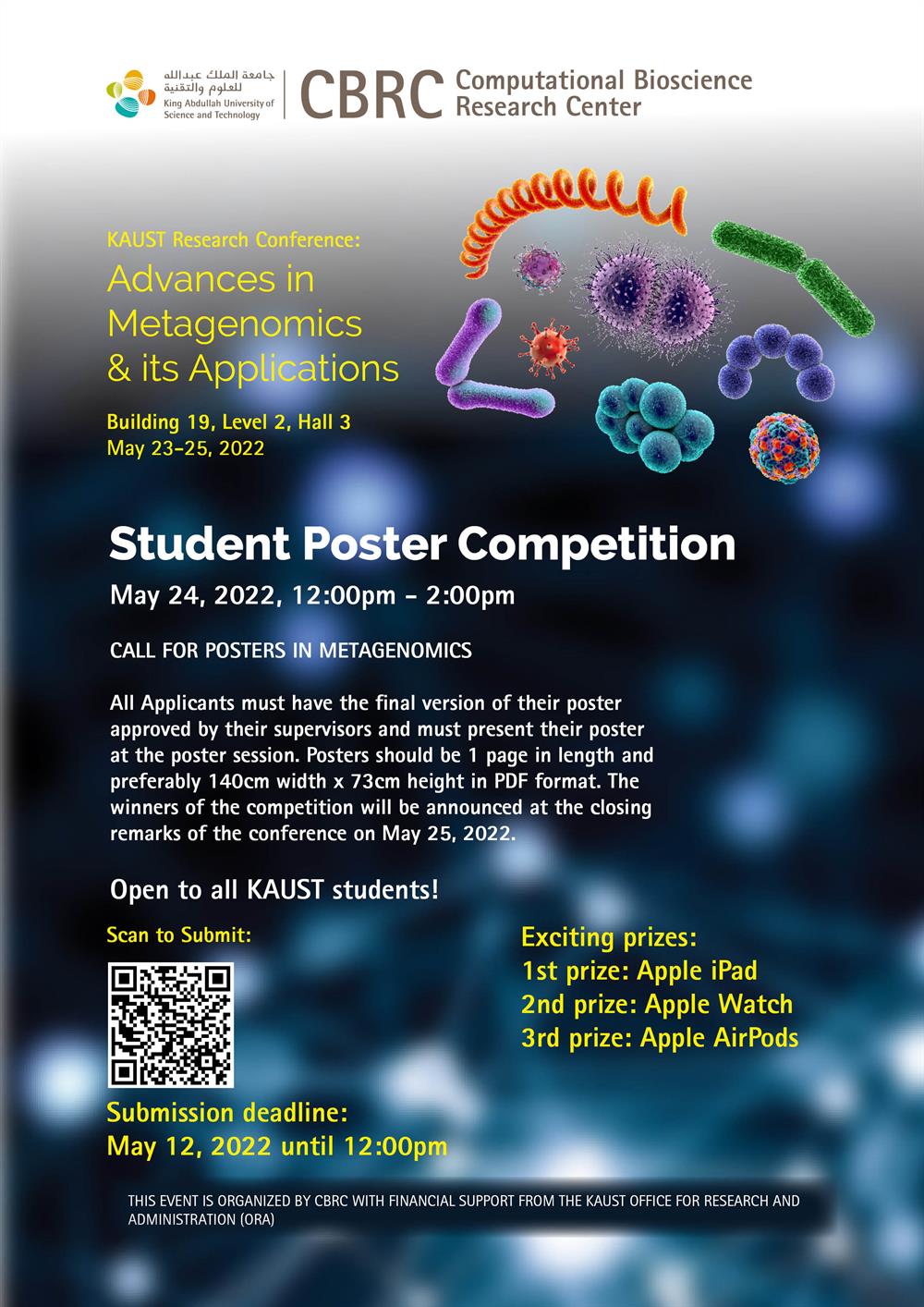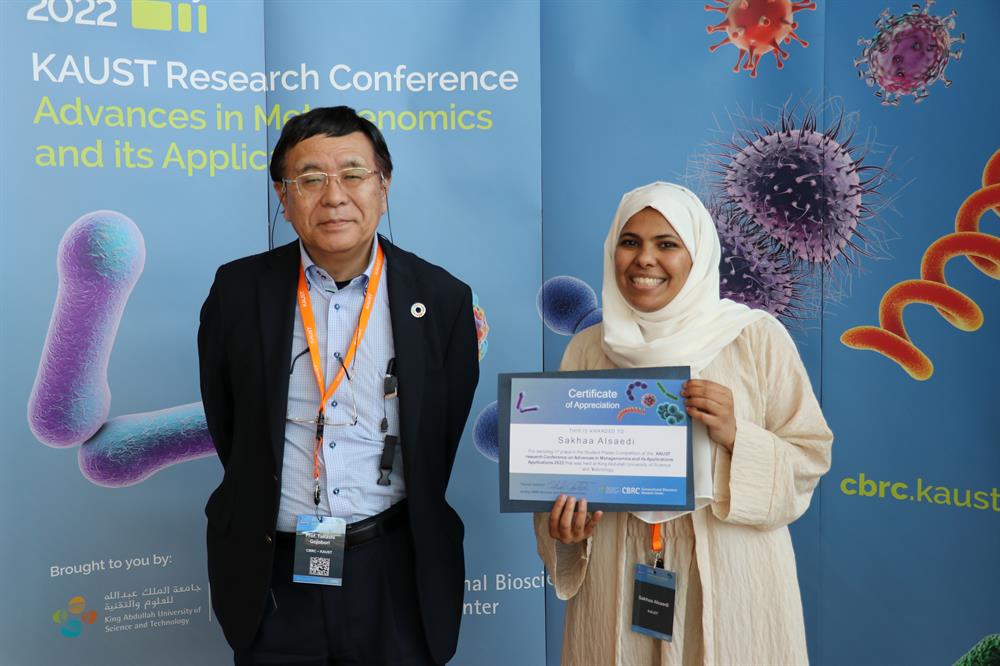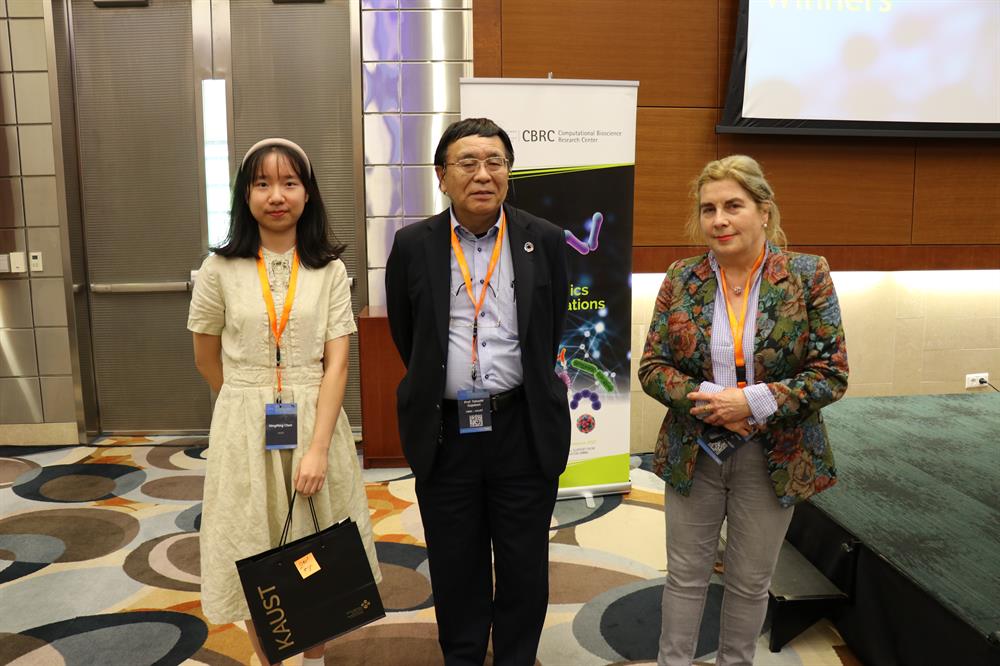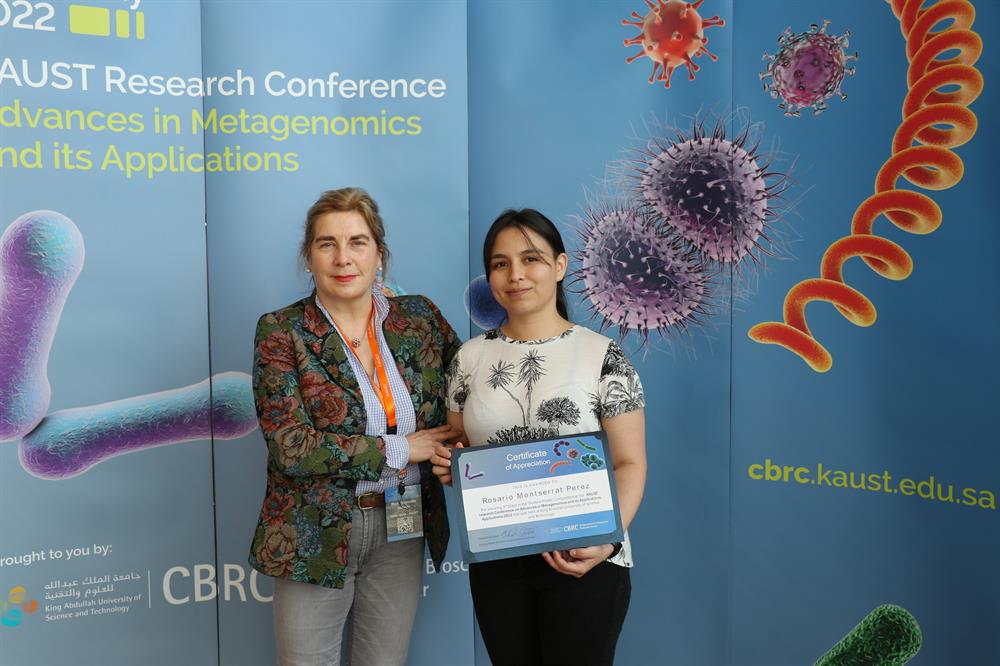KAUST Research Conference
Advances in Metagenomics & its Applications
May 23 - 25, 2022 Building 19, Level 3

The poster competition was judged by the following panelist:
Poster competition winners were as the follows:
Abstract: In infectious diseases, molecular diagnostics are revolutionizing clinical practice by helping doctors understand a patient's cases caused by infection before symptoms and complications. Moreover, using machine learning algorithms to assist doctors in clinical decision-making and diagnosis is critical for patient treatment decisions and their outcomes. However, existing machine learning approaches to patient diagnosis are purely associative, identifying diseases that are strongly correlated with a patient's symptoms without considering the genetic risk factors that cause illness complications. In that case, understanding how different viruses affect individual patients and, in particular, how they interact with different human host cells and immune responses is a fundamental step in order to formulate accurate treatment plans. Since the outbreak of the COVID-19 disease, host genetic variations play the major role of the manifestation of different degrees of severity of illness among different individuals. It is crucial to use this illness as the first case study in our research. Thus, we aim to develop a deep learning model that provides an automated medical plan and predicts the severity score as well as multi-organs dysfunction scores during infection by integrating genetic and viral metagenomic data with metadata and analyzing risk factors. The predicted scores assist doctors in having a better understanding of the COVID-19 patients' cases and provide an accurate treatment plan that could eventually reduce the severity and complication of infectious diseases. In infectious diseases, molecular diagnostics are revolutionizing clinical practice by helping doctors understand a patient's cases caused by infection before symptoms and complications. Moreover, using machine learning algorithms to assist doctors in clinical decision-making and diagnosis is critical for patient treatment decisions and their outcomes. However, existing machine learning approaches to patient diagnosis are purely associative, identifying diseases that are strongly correlated with a patient's symptoms without considering the genetic risk factors that cause illness complications. In that case, understanding how different viruses affect individual patients and, in particular, how they interact with different human host cells and immune responses is a fundamental step in order to formulate accurate treatment plans. Since the outbreak of the COVID-19 disease, host genetic variations play the major role of the manifestation of different degrees of severity of illness among different individuals. It is crucial to use this illness as the first case study in our research. Thus, we aim to develop a deep learning model that provides an automated medical plan and predicts the severity score as well as multi-organs dysfunction scores during infection by integrating genetic and viral metagenomic data with metadata and analyzing risk factors. The predicted scores assist doctors in having a better understanding of the COVID-19 patients' cases and provide an accurate treatment plan that could eventually reduce the severity and complication of infectious diseases.

Abstract: Throughout the pandemic, the severe acute respiratory syndrome coronavirus 2 (SARS-COV-2) spreads and evolves, and many variants emerge under the vaccine and natural infection-derived immune pressure. The spike proteins, especially the human ACE2 receptor-binding domain (RBD), are the primary mutation target sites due to their role in infection and antibody neutralization. Here we develop a novel in silico approach combing the antibody/ACE2 structure modeling and a multi-task deep neural network, to successfully model the fitness landscape of the spike RBD, by accurately predicting the effects of mutations on ACE2 binding and antibody escape. We validate the model's effectiveness with the existing RBD sequences in the GISAID database. Under the high immune selection pressure, we find a significant correlation between the model scores and known variants sampling time. The model can be combined with the genetic algorithm capable of searching for prospective RBD variants that may cause futural concern. The novel mutations searched by our model are also found in immunocompromised long-covid patients. In silico docking experiments of the top 20 searched high-risk variants show that all 20 retained the high antibody escaping potential. This approach could be used for profiling the existing sequences and forecasting prospective high-risk variants, thus may help to guide the development of vaccines and increase preparedness against future SARS-COV-2 variants.

Abstract: Colorectal cancer is the second most prevalent cancer in Saudi Arabia. Due to their anatomical location, tumors closely interact with gut microbiota and affect the metabolome of the tumor microenvironment. To better understand the effect of both pathogenic and commensal microbiota, we have developed a novel peptide-based colorectal cancer organoid model which recreates both the biochemical and physicochemical properties of the tissue to study tumor-microbiome interactions. These novel self-assembly peptides replicate the adhesive functionality of laminin and fibrinogen and the Nano topological properties of the non-bio functional peptide. Moreover, the colorectal organoids cultured in these bio functional scaffolds show functional and morphological properties similar to those cultured in Matrigel. In a later stage, fecal samples of healthy and cancer patients will be analyzed by next-generation sequencing. After identifying the most common bacterial species/strains in these samples, the most relevant will be segregated into a simplified human intestinal microbiota (SIHUMIx). The simplified human microbiome will be microinjected in the colorectal cancer model to study the affected pathways by integrating multi-omics analyses.
